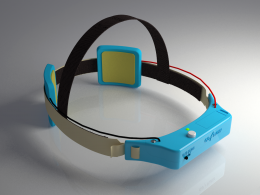GoFlow
| GoFlow | |
|---|---|

|
|
| Category | Transcranial direct-current stimulation |
| Developer | GoFlow |
| Announced | March 2012 [1] |
| Released | Developers:
Consumers: project cancelled [2] |
| Price | 99 USD (March 2012)[3] the device was never shipped |
| Max output | 2 mA2 T 0.002 A [4] |
| Session duration | |
| Scalp location | |
| Weight | g |
| Controls |
N/A |
| Data available | |
| Risk factor | |
| Medical prescription | No |
GoFlow is a small head mounted device which provides a certain form of brain stimulation, namely transcranial direct-current stimulation. The device was developed by students at the University of Michigan and was never shipped.[1]
http://www.diytdcs.com/tag/goflow/
Contents
Main characteristics
Purpose
The main purpose is to enhance skills of its users by publicly available tDCS device.
Company & People
GoFlow was originally developed by students at the University of Michigan but it has never been shipped.
- Matt Sornson - the co-founder of GoFlow
- Nick Woodhams - the co-founder of GoFlow[1]
- Benjamin Syzek - Ph.D neuroscience student at Michigan State University [5]
Important Dates
- spring 2012 - the new device was announced and the Kickstarter campaign began
- May 2012 - the Kickstarter campaign was delayed and later cancelled because of FDA involvement
- early 2013 - the developers give up the development of an available tDCS device and sold the project to the Foc.us company
- summer 2013 - the first device tDCS which was produced by Foc.us was released[1]
Enhancement/Therapy/Treatment
Ethical & Health Issues
Public & Media Impact and Presentation
Personally, statements such as "our tDCS kit is the shit" and "get one of the first β1's and will help us develop β2" on the webstie are not exactly instilling confidence to me, but if you're big into the early adopter adventure, GoFlow may have something for you to test.[6]
Given the (lack of) production values in their promotional video, I’m not all that reassured by the included testimonial from a neuroscience graduate student. [7]
Public Policy
Related Technologies, Projects or Scientific Research
References
- ↑ 1.0 1.1 1.2 1.3 WEXLER, Anna. A pragmatic analysis of the regulation of consumer transcranial direct current stimulation (TDCS) devices in the United States. Journal of Law and the Biosciences [online]. 2015, Oct 12. Available online at: http://jlb.oxfordjournals.org/content/2/3/669.full.pdf+html (Retrieved 1st November, 2016).
- ↑ JOHN. News from GoFlow! Good and Bad. DIY tDCS [online] 2013, Jun 7. Available online at: http://www.diytdcs.com/2013/06/news-from-goflow-good-and-bad/ (Retrieved 1st November, 2016).
- ↑ JOHN. GoFlow: Learn Faster. DIY tDCS [online]. 2012, Mar 17. Available online at: http://www.diytdcs.com/2012/03/goflow-learn-faster/ (Retrieved 21st November, 2016).
- ↑ VANCE, Ashlee. A brain charger for $100 - but will it work?. SFGate [online]. 2012, Mar 25. Available online at: http://www.sfgate.com/business/article/A-brain-charger-for-100-but-will-it-work-3432153.php#ixzz25TjyRopo (Retrieved 21st November, 2016).
- ↑ EPSTEIN, Zach. $99 DIY kit overclocks your brain. BGR [online]. 2012, Mar 14. Available online at: PMhttp://bgr.com/2012/03/14/99-diy-kit-overclocks-your-brain-video/ (Retrieved 21st November, 2016).
- ↑ VERRY, Tim. GoFlow To Offer $99 tDCS Brain Augmentation Kit. PC Perspective [online]. 2012, Mar 12. Available online at: https://www.pcper.com/news/General-Tech/GoFlow-Offer-99-tDCS-Brain-Augmentation-Kit (Retrieved 21st November, 2016).
- ↑ MIMS, Christopher. DIY Kit Overclocks Your Brain With Direct Current. MIT Technology Review [online]. 2012, Mar 09. Available online at: https://www.technologyreview.com/s/427177/diy-kit-overclocks-your-brain-with-direct-current/ (Retrieved 21st November, 2016).